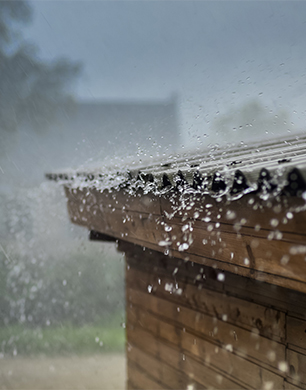 Anyone would rather stay cozy at home when it’s raining outside. However, that’s simply impossible to do when your house isn’t prepared to handle the weather. Aside from fixing the damages that your house has sustained, you still have to worry about your family’s safety.
Anyone would rather stay cozy at home when it’s raining outside. However, that’s simply impossible to do when your house isn’t prepared to handle the weather. Aside from fixing the damages that your house has sustained, you still have to worry about your family’s safety.
People are always reminded how to be storm-ready so they can stay prepared and safe. While it’s great to prepare the necessary resources to survive storms, you also have to invest in your home’s exteriors to minimise rain-related troubles.
Rainy Season Checklist: Getting Your Home Ready To Take Nature’s Pounces
Most home improvement tips focus on your home’s interiors. However, if you live in an area where rains can be quite troublesome, you should also consider investing in home improvement measures that can help make your house weather-proof.
Leaks and flooding may seem like predictable inconveniences during the rainy season. Unfortunately, it can also compromise your safety if you don’t do something about your faulty house structures.
Worse, repairs and installations aren’t exactly easy to do in bad weather conditions. For the hassles that contractors have to go through, you may end up spending more money for being reactive instead of preventive.
The good news is that you can prepare for the rainy season by taking the effort to do simple house inspections. Online builders merchants like this one, for example, provide rain-ready materials that can handle even the most intense of weathers. Thus, if you need to replace any of your current structures, it’s worth sourcing your materials from them.
Are you ready to go over your rainy season checklist? Listed below are six tips to prepare your house for the upcoming weather disturbances:
- Inspect Your Roof
Your roof serves as your main protector from all the elements. Thus, you want to make sure that it does its job properly, especially when strong storms are about to hit the area.
Check your roof for any sagging or aging spots, or damaged shingles. Some types of damage can be repaired, but others may need overhauls. Better have them checked when it’s dry and sunny than scramble for solutions when the rains come.
- Clear Your Rain Gutters
Once you’re sure that your roofs are in the clear, it’s time to move on to your rain gutters. As the name implies, they’re a structure that’s responsible for keeping rainwater away from your house.
It’s important that the gutters allow water to flow freely into the drains. You may choose to clean them on your own by spraying it with your hose. To make things easier, you can attach a specialised cleaning tool to your hose that’s made specifically for rain gutters.
Of course, if your gutters have mould, erosion, or leakage issues, that’s a job for home improvement contractors.
- Inspect Your Windows And Doors
Another way for rainwater to enter your home is through your windows and doors. Thus, make sure that they’re properly sealed and can be closed without any gaps.
You may not have to worry about these things if your windows and doors are newly installed, but if they’re relatively old, it’s recommended to have them inspected so that they can be repaired, repainted, or replaced as needed.
- Keep Important Things In The Outdoor Storage
If you spend a considerable amount of time outside your house, chances are you’re leaving important things outdoors. Make sure that you stow away things, like power tools, lawn mowers, and barbecue grills, in your outdoor storage.
For sheds, see to it that its roof remains in proper working order. For outdoor wooden materials and furniture, a waterproof treatment can help ensure that they’d stay sturdy, even in the rain.
- Repaint Your Home Exteriors
Repainting your exterior walls doesn’t only improve the look of your house, but it can also protect it better from stormy weather. Using a waterproof paint through water sealants can help it withstand even the heaviest of rains.
- Manage The Exteriors Of Your Basement
The basement is usually prone to flooding if the walls and floors of your home are leaking. Evidence of water damage includes the growth of mildews and molds. While a contractor can help you solve this from the inside, they can also fix the landscaping outside your basement to prevent the water from coming in.
A Little Foresight Can Save You From Bad Weathers
The rainy season can be difficult to deal with, but you can make things easier if you’re heading into it well-prepared. As early as now, make sure that your home’s exteriors are ready to take on all weather-related challenges. When the storms come, you’ll thank yourself for doing what you had to do sooner.

